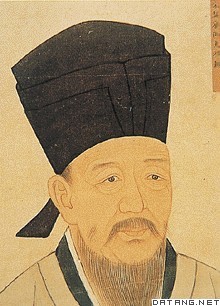This article needs additional citations for verification. (August 2010) |
Chéng Hào (Chinese:
| Cheng Hao | |||||||||||||||||||||||||||
|---|---|---|---|---|---|---|---|---|---|---|---|---|---|---|---|---|---|---|---|---|---|---|---|---|---|---|---|
 Cheng Hao | |||||||||||||||||||||||||||
| Traditional Chinese | |||||||||||||||||||||||||||
| Simplified Chinese | |||||||||||||||||||||||||||
| |||||||||||||||||||||||||||
| Alternative Chinese name | |||||||||||||||||||||||||||
| Chinese | |||||||||||||||||||||||||||
| Literal meaning | (courtesy name) | ||||||||||||||||||||||||||
| |||||||||||||||||||||||||||
Life
editHao's grandfather was a county magistrate in Huangpi and died there while in that capacity. Hao's father Cheng Xiang (Chinese:
Cheng Hao and Cheng Yi were among the pioneers of Song dynasty Neo-Confucianism, and they are often credited with its formal creation along with Zhu Xi and several other scholars. The two brothers were sometimes referred to as "The Two Chengs" (Chinese:
Legacy
editHao was known as an outgoing, laid-back, and lively man, in contrast to his stern and severe younger brother. As Neo-Confucianism's popularity grew throughout the early second millennium AD, the two Cheng brothers along with Zhou Dunyi, Zhang Zai, Shao Yong, and Sima Guang became known as "The Six Masters of Northern Song"[5] for their philosophical contributions.
Hao also received several posthumous titles: in 1220 he was given the posthumous name "Lord of Purity" (Chinese:
Cheng Hao's offspring held the title of Wujing Boshi (
In 1452 Wujing Boshi was bestowed upon the offspring of Mengzi-Meng Xiwen (
References
edit- ^ "Cheng Hao" at the Internet Encyclopedia of Philosophy
- ^ Huangpi Government Website (Chinese)[permanent dead link]
- ^ Cheng Yi wrote: "The Heavens themselves are li." (Chinese: "
天 者 理 也"). - ^ Chinese: "
君子 之 學 ,必至 聖人 而後己 。不 至 聖人 而自己 者 ,皆 棄也。" - ^ Chinese:
北 宋 六 先生 - ^ H.S. Brunnert; V.V. Hagelstrom (15 April 2013). Present Day Political Organization of China. Routledge. pp. 494–. ISBN 978-1-135-79795-9.
- ^ "P.494-5. Present Day Political Organization of China". Archived from the original on 2016-04-25. Retrieved 2016-04-17.
- ^ "Present day political organization of China".
- ^ Chang Woei Ong (2008). Men of Letters Within the Passes: Guanzhong Literati in Chinese History, 907-1911. Harvard University Asia Center. p. 132. ISBN 978-0-674-03170-8.
- ^ "
熾 天使 書 城 ----明 史 ". - ^ "Kanripo
漢籍 リポジトリ : KR2m0014欽定 續 文獻 通 考 -清 -嵇璜". - ^ "
欽定 歷代 職 官 表 :卷 六 十 六 -中國 哲學 書 電子 化 計 劃". - ^ "Archived copy". Archived from the original on 2016-10-07. Retrieved 2016-05-09.
{{cite web}}: CS1 maint: archived copy as title (link) - ^ "●
欽定 續 通 典 卷 三 十 一 職 官 九 -续通典 -四大名著文学网". Archived from the original on 2016-10-07. Retrieved 2016-10-04. - ^ "Archived copy". Archived from the original on 2016-10-23. Retrieved 2016-05-09.
{{cite web}}: CS1 maint: archived copy as title (link) - ^ "Workingyam76
的 網 路 日誌 ". - ^ https://www.researchgate.net/publication/248653434_The_Ritual_Formation_of_Confucian_Orthodoxy_and_the_Descendants_of_the_Sage p. 571.
- ^ Wilson, Thomas A.. 1996. “The Ritual Formation of Confucian Orthodoxy and the Descendants of the Sage”. The Journal of Asian Studies 55 (3). [Cambridge University Press, Association for Asian Studies]: 559–84. doi:10.2307/2646446. https://www.jstor.org/stable/2646446 p. 571.